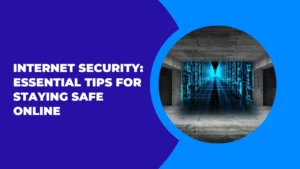Physical Address
304 North Cardinal St.
Dorchester Center, MA 02124
Physical Address
304 North Cardinal St.
Dorchester Center, MA 02124

The internet has become an integral part of our lives, and with it comes the need for internet security. Cybercriminals are always on the lookout for ways to steal sensitive information or compromise online security. In this blog post, we will provide essential tips for staying safe online.
We will dive deep into understanding internet security, common threats like malware and phishing attacks, and how to protect your data online.
Additionally, we will discuss keeping your devices secure, email safety, network security, mobile internet security, practical internet safety tips, family internet safety, and best practices for safe online banking and shopping. Stay tuned as we share expert insights on how you can keep yourself protected while browsing the web.

The internet is filled with potential risks and threats, making it essential to understand internet security, especially for Android users. Protecting personal data online is crucial to preventing unauthorized access and safeguarding sensitive information.
By implementing internet security measures, such as using strong passwords, keeping security software up-to-date, and being aware of common internet security threats like malware and phishing attacks, users can ensure a safer online browsing experience. Understanding internet security is a necessary step toward maintaining a secure online presence.
In today’s digital age, internet security has become more important than ever. Cybercriminals are constantly evolving their tactics to exploit vulnerabilities and gain unauthorized access to personal data. Protecting your personal information online is vital to preventing identity theft and financial loss due to online scams.
The consequences of a data breach can be severe and long-lasting. Therefore, prioritizing internet security, including protecting yourself from the dark web, is essential for a safe and secure online experience.
Antivirus software is crucial for detecting and removing malware, while encryption protects sensitive data from unauthorized access. Firewalls act as barriers against potential threats.
Regular software updates, such as those for Windows 10, ensure the latest security patches are installed, and strong, unique passwords are essential for protecting online accounts. By incorporating these key components, you can enhance your internet security and safeguard your personal data from various internet security threats.

Malware, phishing attacks, vulnerable Wi-Fi networks, ransomware, and social engineering are common Internet security threats. Malware can compromise personal data on various devices and operating systems. Phishing attacks deceive users into revealing sensitive information.
Insecure Wi-Fi networks can be exploited by hackers. Ransomware encrypts files and demands a ransom for their release. Social engineering techniques manipulate individuals to disclose personal information. Understanding these threats, including the threat of botnet attacks, is crucial for implementing effective security measures.
Viruses infect and corrupt files, while spyware secretly gathers personal data. Worms replicate and spread across networks, and Trojans deceive users by disguising themselves as legitimate software. Ransomware encrypts files and demands payment for their release.
Understanding these malware types is crucial for safeguarding your online security, especially when using search engines like Google. By familiarizing yourself with the different types of malware and their effects, you can take proactive steps to protect your devices and personal information.
Phishing emails aim to deceive recipients into disclosing sensitive information, while social engineering attacks exploit human psychology to manipulate individuals.
These scams often impersonate reputable organizations or individuals. Awareness and caution are crucial in avoiding falling victim to phishing attacks, which can result in identity theft and financial loss. Protect yourself by staying vigilant and verifying the authenticity of any requests for personal data or financial information.
Unsecured Wi-Fi networks can allow hackers to intercept data, posing a threat to personal data security. Weak or default router passwords make your network vulnerable to unauthorized access.
Man-in-the-middle attacks have the potential to intercept and alter data sent over a network. These network vulnerabilities emphasize the importance of properly securing your Wi-Fi network, ensuring internet security, and protecting against potential attacks.
Implementing multifactor authentication provides an extra layer of security. Regularly backing up data helps prevent permanent loss. Using a virtual private network (VPN) encrypts internet traffic, safeguarding personal data.
Password managers assist in creating and storing strong, unique passwords. Being cautious about the websites visited and links clicked helps prevent malware infections. By following these best practices, users can protect their data online and minimize the risk of falling victim to internet security threats.
Multifactor authentication plays a crucial role in enhancing internet security. By requiring multiple forms of verification, it adds an extra layer of protection to online accounts. This makes it more difficult for unauthorized individuals to gain access.
Multifactor authentication can involve something you know, have, or are, providing an additional safeguard against password breaches and unauthorized access. It is encouraging to see that many online services now offer multifactor authentication as an option, prioritizing user security.
Firewalls are a crucial component in ensuring online safety. Acting as a barrier between devices and potential threats, they monitor network traffic for suspicious activity.
By preventing unauthorized access to devices and data, firewalls offer added layers of protection. It’s essential to keep firewall software up to date for optimal security. Both hardware and software firewalls play a significant role in safeguarding against internet security threats.
When it comes to protecting your personal data and ensuring a secure online experience, choosing the right browser is crucial. To safeguard against malware and phishing attacks, avoid browsers with known vulnerabilities. Look for ones that offer built-in security features like pop-up blockers and anti-tracking tools.
Consider using reputable options like Firefox or Brave, known for their focus on privacy and computer security. Remember to enable automatic updates and utilize browser extensions like HTTPS Everywhere for encrypted communications.
Creating strong, unique passwords for each online account is crucial to preventing unauthorized access. To securely store and manage your login credentials, consider using a password manager.
Additionally, enabling two-factor authentication adds an extra layer of security. It’s important to regularly update passwords and avoid reusing them across multiple accounts. Stay cautious of phishing attempts that may trick you into revealing your passwords.
Installing antivirus software on all your devices is essential for protection against malware and other threats, especially with the advanced features available in modern software. It’s also important to keep your operating system and apps up-to-date with the latest security patches.
Safeguard sensitive data on your devices by using encryption. Be cautious when downloading and installing third-party apps, as they may contain malware. Regularly scanning your devices for malware infections using reputable antivirus software is crucial.
To ensure you have the latest protection, enable automatic updates for your security software. If automatic updates are not available, make sure to regularly check for updates manually. Keep your antivirus software, firewall, and other security tools up to date to stay protected against emerging threats.
Remember to update your security software before conducting any sensitive online activities. By consistently updating your security software, you can safeguard your personal data and defend against various internet security threats.
To ensure your devices are free from spyware, it’s important to be vigilant for signs of unusual activity or performance issues. Regularly running antivirus scans can help detect and remove any spyware that may have infiltrated your system.
Additionally, it’s crucial to avoid downloading software or files from untrusted sources and to use a reliable ad-blocker to minimize the risk of malicious ads containing spyware. If you suspect your device is infected, seek professional assistance for thorough removal.
Protecting your email from threats is crucial. Stay cautious when opening attachments or clicking on links, as they could contain malware or phishing attempts. Update your email client regularly for the latest security features. Use strong, unique passwords and enable two-factor authentication for added security. Be wary of emails requesting sensitive information or urgent action.
Be cautious of unsolicited emails, especially those promising financial rewards or urgent requests. Use spam filters to prevent unwanted and potentially malicious emails from reaching your inbox. Report phishing emails to your email provider to help protect others from falling victim.
Be wary of emails asking for personal information, even if they appear to be from legitimate organizations. Educate yourself about common email scams and tactics used by cybercriminals.
When it comes to email privacy and security, there are several best practices you can follow. Firstly, try to avoid sending sensitive information via email whenever possible. To further protect your email communications, consider encrypting them to prevent interception.
It’s also important to regularly review and manage your email security settings to ensure they align with your preferences. Additionally, be cautious of email forwarding and auto-fill features, as they may expose your information. Lastly, keeping your email client and plugins up-to-date is crucial to addressing any security vulnerabilities.
Changing the default password on your Wi-Fi router helps prevent unauthorized access. Enabling network encryption, like WPA2, secures your Wi-Fi connection. Regularly updating your router’s firmware protects against known vulnerabilities.
Disabling remote management features on your router prevents unauthorized access. Consider using a virtual private network (VPN) for added privacy and security on public Wi-Fi. Protecting your Wi-Fi and internet connection is crucial for safeguarding personal data and staying safe online.
To ensure the security of your Wi-Fi router, consider disabling guest network access if it’s not needed to minimize the risk of unauthorized access. Use a strong Wi-Fi password that includes a combination of letters, numbers, and special characters.
Enable network encryption, such as WPA2 or WPA3, to protect your Wi-Fi traffic from eavesdropping. Change the default login credentials for your router’s administration interface and keep your router’s firmware up-to-date to benefit from security patches and improvements.
Using a VPN offers numerous advantages for internet security. It helps protect your sensitive information by preventing hackers and unauthorized access. Additionally, it encrypts your internet traffic, ensuring that it cannot be intercepted by malicious entities.
A VPN allows you to safely access blocked or restricted websites and content while maintaining your privacy and anonymity online. It also ensures secure communication and data transfer, especially when using public Wi-Fi networks.
Install antivirus software on your mobile devices to protect against malware and viruses. Use strong and unique passwords for your mobile apps and accounts. Be cautious when downloading apps from third-party sources to avoid installing malicious software.
Keep your mobile operating system and apps up to date to patch security vulnerabilities. Enable multi-factor authentication for an extra layer of security.
Detecting and preventing phone tapping is crucial for maintaining your privacy and security. To ensure that your calls are not being intercepted, regularly check for unusual call quality or background noise during phone conversations. Pay attention to any echoes or strange interference.
Monitor your phone’s battery usage and data usage for any anomalies, as these could be signs of unauthorized surveillance. Be cautious of unfamiliar messages or emails asking for personal information, and consider using encrypted messaging apps for sensitive conversations.
Keeping your phone’s operating system and apps updated will also help ensure the latest security features are in place.
Phone spoofing is a technique where scammers use false caller ID information to make it appear as though they’re calling from a different number or organization.
To protect yourself from phone spoofing, be cautious of calls or messages from unknown numbers claiming to be from legitimate organizations.
Avoid sharing personal or financial information over the phone unless you initiate the call. Consider using call-blocking services or apps to filter out unwanted calls and enable Caller ID and spam call protection features on your phone. If you encounter phone spoofing, report it to your phone service provider.
Continuous monitoring and protection against evolving online threats are essential in today’s digital landscape. With real-time detection and removal of malware, viruses, and other malicious software, 24/7 internet security software ensures your personal data remains secure.
It also provides protection against phishing attacks and scams that attempt to steal sensitive information. By safeguarding against unauthorized access and data breaches, this software offers peace of mind. Plus, automatic updates keep the software current and effective, providing an added layer of defense against internet security threats.
Ad-blockers play a crucial role in maintaining privacy online. By blocking intrusive ads, they prevent potential exposure to malware and harmful websites. They also protect against tracking cookies that collect personal data and browsing activities.
Ad-blockers reduce the risk of falling for deceptive or malicious advertisements, ensuring a safer browsing experience. Additionally, these tools improve website loading speeds by blocking scripts and trackers. By enhancing privacy, ad-blockers contribute to a more secure online environment.
To ensure webcam security, it is recommended to cover the webcam when not in use with a physical webcam cover or tape. Additionally, disable or restrict webcam access for unnecessary apps, and be cautious when granting webcam access to websites.
Regularly updating the webcam driver and firmware is important for security patches. Using security software that includes webcam protection features is also crucial for safeguarding personal data. Implementing these measures helps protect against potential privacy breaches and unauthorized access to the webcam.
When it comes to family internet safety, it’s crucial to educate your children about the potential dangers of the internet. Set parental controls and restrictions on devices, and monitor their online activities. Establish open communication and teach them about responsible social media usage, emphasizing the importance of privacy settings.
Installing reputable internet security software on all family devices adds an extra layer of protection against internet security threats. By taking these steps, you can ensure a safer online experience for your family.
When it comes to ensuring your children’s online safety, there are a few key tips to keep in mind. First, encourage them to use strong and unique passwords for their online accounts. Teach them to be cautious about sharing personal information with strangers and emphasize responsible online behavior.
Setting guidelines for internet usage, including time limits and safe websites, is also crucial. Regularly discussing online safety with your children and addressing their concerns or questions will help create a safer online environment for them.
Utilizing parental controls is essential for ensuring a safer internet experience for children. Enable these controls on devices to limit access to inappropriate content and set time limits to manage screen time. Filtering websites and blocking specific content categories can help protect children from harmful material.
It is also important to monitor online activity and receive alerts for suspicious behavior or potential risks. By restricting access to social media platforms, you can prevent cyberbullying and online harassment. Implementing these measures will safeguard your children in the digital world.
Best practices for safe online banking and shopping include using strong, unique passwords for each account, being cautious of phishing emails and suspicious links, keeping software updated, shopping on secure websites with HTTPS encryption, and using a VPN when on public Wi-Fi networks.
In conclusion, prioritizing internet security is essential in today’s digital landscape. By understanding the importance of internet security and implementing key components like strong passwords, firewalls, and multifactor authentication, you can protect your data from common threats such as malware, phishing attacks, and network vulnerabilities.
Additionally, keeping your devices secure through regular updates and using reputable security software is crucial. It’s also important to safeguard your email, Wi-Fi, and mobile devices through practices like email privacy measures, securing your Wi-Fi router, and utilizing VPNs. Lastly, practicing practical internet safety tips, implementing family internet safety measures, and following safe online banking and shopping practices ensure a safer and more secure online experience for yourself and your loved ones.
Stay vigilant and prioritize internet security to protect your personal information and maintain your online privacy.